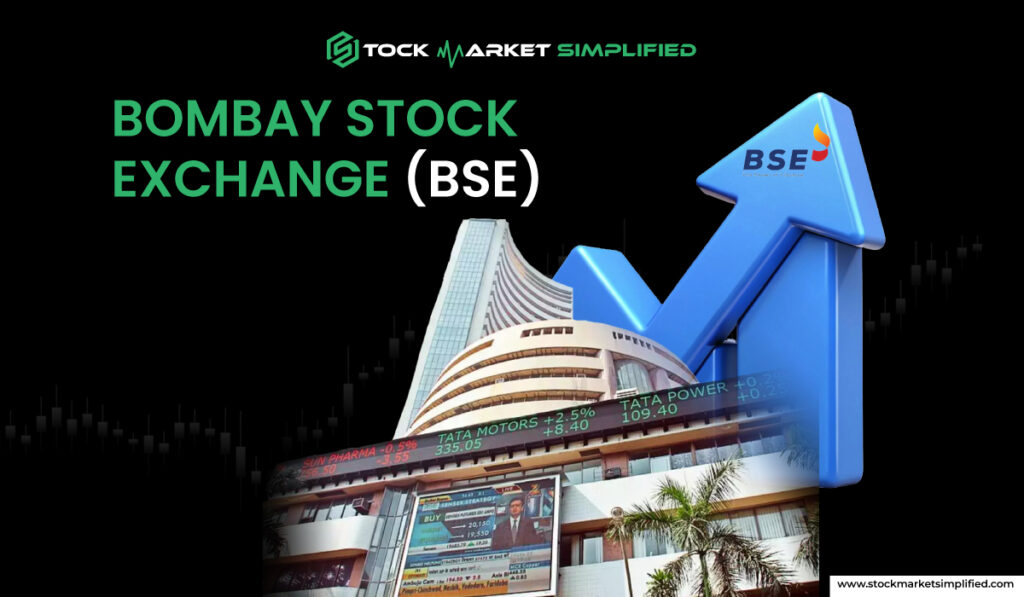Bombay Stock Exchange(BSE)

The Indian stock market holds the history where fortunes are made and dreams come true. It’s one of the fastest-growing marketplace in the world that tells stories of thousands triumphs, challenges, and endless possibilities.
The journey of Indian financial development goes back to the 18th century, when East India company first issued shares and bonds. And that’s how, in 1875, Bombay Stock Exchange (BSE) was established. With time, it has transformed itself from a small, informal marketplace to a sophisticated, well-regulated financial ecosystem. But what is BSE, how it works, what is its background, functions, and operations. This blog goes in-depth into details to explain thorough data on BSE in the most simplified way.
What is Bombay Stock Exchange?
Imagine a big marketplace or bazaar where people buy and sell securities and other financial instruments of big companies. Akin to this, the Bombay Stock Exchange, or BSE was established with the purpose of trade, not products, but securities or financial assets.
BSE is the first and oldest stock exchange in India as the Naive Share and Stock Brokers Association. Founded in 1875, the association is situated in Mumbai, Maharashtra. Popular as the first ever stock exchange established in overall Asia, BSE has over 5000 listed companies and a market cap of $3.5 trillion. Over the years, the platform has developed itself and offered several services and products, including;
- Equity
- Debt
- Currency trading
- Mutual funds
- Investment banking
- Bonds, etc.
As per the data 2023, BSE is one the largest stock exchanges, followed by NYSE, NASDAQ, LSE, and SSE. It has upgraded and maintained a high level of transparency, accountability, top-notch technology, and efficient trading mechanisms.
What is Dalal Street?

Dalal Street is the heartbeat of the Indian financial world. It is located in Mumbai, Maharashtra, India. In Hindi language, the word “dalāl” which means a “go-between” and a “broker”. The story of Dalal Street can be traced back to the 1850s, when stockbrokers did their business deals under a banyan tree before Mumbai town hall. The brokers of Dalal Street were known for their quick decision making abilities and willingness to take risks. Hence after changing many various locations, it was formally selected in 1874 as the main financial center for the Native Share and Stock Brokers Association, which later became BSE.
How Does BSE Work

The Bombay Stock Exchange (BSE) is like a giant online shop for stocks and bonds. Here’s a simple guide to how it works:
Assume an online application where money is the game and you can buy or sell any financial instruments, such as bonds, stocks, derivatives, and currencies. It follows the price-time priority principle, which means if you place an order to buy or sell something, the system looks at the best price available and triggers the order. It uses a smart trading system called Bolt which helps people trade easily. The BSE uses this highly advanced technology for quick and fair order execution.
What makes it even more interesting is that the BSE has rules and a system to keep everything fair, like referees in a game. The exchange keeps a close watch on any unfair practices like insider trading to maintain transparency and protect investor’s integrity. Companies listed on BSE need to follow those rules about sharing information. Anyone who wants to join this stock market can easily access it through brokerage firms or online platforms.
Functions and Operations

BSE is like the brain and heart of the Indian stock market. It’s where people trade, rules are followed, and everyone, from big investors to regular folks, can be part of the financial fun. Despite offering a place to trade, there are several functions and operations of BSE. Let us explore them one by one:
Primary and Secondary Market:
If you want to buy something, there is always someone ready to sell. BSE offers investors both primary and secondary markets, ensuring investors get options to pick from the online store of financial stuff.
Listing and Trading:
Companies issue their shares to raise capital to the BSE for listing. People also use it to buy and sell stocks or make bets on future prices. BSE also offers a fair, transparent, and regulated marketplace where buyers and sellers can transact securities.
Regulation and Oversight:
BSE works under the regulations of SEBI (Securities and Exchange Board of India), following certain rules and regulations. Companies listed on BSE need to share information, follow rules, and play fair. It helps protect investors and make smart moves.
Indices:
What’s more popular about BSE is its benchmark indices – the Sensex (Sensitive Index) that shows market trends of representative stocks. Sensex acts as the pressure indicator and is closely reviewed by traders globally.
Background of BSE

The history of BSE goes back to 1875, when people used to travel using horses and carriages. A group of traders decided to introduce a place to buy and sell stocks. It’s like they built a grand financial playground. Over the years, this trading playground grew and became more organized. In 1956, it officially became the Bombay Stock Exchange, right in the heart of Mumbai.
The Digital Leap
In the 1990s, when computers became a big deal among users, BSE took a giant leap into the digital world. It bid farewell to the traditional ‘shout and signal’ trading and adopted new electronic trading.
Now, BSE acts like a modern, digital city within Mumbai. It’s a place where people from all categories, including professional traders, big investors, small traders, and curious learners, all come together in a frame to play the money game.
Trend Setter and Record Breaker
BSE has always loved being the trend setter. It was the first exchange to introduce many cool ideas, such as Sensex – a way to measure how the stock market is doing.
From the 18th century till now, BSE has shown a broad view to the Indian stock market, making it one of the largest stock exchange markets globally.
Benefit of Listing on BSE

There are many benefits of listing on BSE that a company can enjoy. Some of them are as below:
| Advantages | Explanation |
| Access to Capital | Listed companies can raise funds by issuing their stocks. It can help them with additional funds for growth and expansion. |
| Visibility and Credibility | Gain visibility among markets and investors. This overall enhances the company’s credibility. |
| Liquidity for Shareholders | Shareholders can easily buy or sell their shares. |
| Investor Base Expansion | Listing on BSE opens doors to a broader investor base, increasing shareholder’s reach. |
| Regulatory Framework | Regulatory framework of BSE makes sure all the trades are fair and transparent to foster integrity of investors. |
| Benchmarking with Sensex | Companies can benchmark their performance against the well-known Sensex index. |
| Global Recognition | Listing on BSE lets companies attract global investors, potentially widening the pool of investors. |
| Trading Efficiency | Using an electronic trading platform, BSE makes sure that orders are executed quickly and efficiently for listed securities. |
What Are The Various Investment Methods in BSE?

Investors can trade using various investment methods in BSE. Let’s get to know some of the popular ones:
Equity (Shares):
The most commonly used investment method – equity. A person can buy or sell their securities or launch their Initial Public Offerings (IPOs). BSE lets investors and companies trade these equities in both primary and secondary markets.
Mutual Funds:
Investors can pool their money in professionally-managed diverse investment portfolios till maturity to reap benefits.
Exchange Traded Funds (ETFs):
Imagine a basket of different investments, including bonds or stocks. They follow specific indices (like BSE Sensex) and give investors a way to invest in a mix of different stocks.
Bonds:
Bonds are a way for companies and governments to raise money. When an investor buys a bond from BSE, they’re basically lending money, and in return, get regular interest payments.
Derivatives:
BSE allows investors to play with financial tools – options and futures and earn benefits.
Also Read: How to Start Investing with Little Money: Smart Strategies for Beginners
Major Indices at BSE

The key index of Bombay Stock Exchange known as Sensex. It acts like the VIP list of the top 30 companies in India. BSE keeps an eye on how these companies are doing in the stock market. But wait, there is more!
BSE has other indices, too, depending on type of companies, such as goods, healthcare, cars etc. It even has indices for mid and smaller-sized companies, known as small cap and madcap. Below are listed major indices at BSE (Bombay Stock Exchange):
- S&P BSE Sensex
- S&P BSE Auto
- S&P BSE 500
- S&P BSE Bankex
- S&P BSE Smallcap
- S&P BSE Healthcare
- S&P BSE Midcap
- S&P BSE Capital Goods
- S&P BSE Consumer Durables
- S&P BSE Fast Moving Consumer Goods
In A Nutshell
In essence, BSE is Asia’s oldest and first stock exchange platform that began back in the 18th century and has come too far in terms of advancement. Investing through Bombay Stock Exchange (BSE) offers investors multiple choices such as mutual funds, stocks, ETFs, etc. It is operated in Dalal Street, the financial hub, reflecting market trends. From IPOs to bonds, BSE provides diverse options. Dalal Street and BSE are not just about numbers; they are about choices and the economic pulse of India.
FAQs
What is the largest stock exchange in the world?
As per the reports of Sept 2023, the world’s largest stock exchange is NYSE (New York Stock Exchange) globally, with a market cap of over $25 trillion in equity.
What are the largest companies listed on the BSE?
In Jan 2024, Reliance Industries LTD, TCS (Tata Consultancy Services LTD), HDFC Bank LTD., and ICICI Bank LTD were noted as the top companies on the BSE.
What global stock exchanges function similarly to BSE?
In India, NSE (National Stock Exchange) works parallel to BSE. On the other hand, in global markets, there are many stock exchanges, few of them the NEW York Stock Exchange, Nasdaq, and LSE (London Stock Exchange).
What does BSE do?
BSE offers a platform to trade many financial tools such as debt instruments, equity shares, derivatives, mutual funds, etc. It plays a crucial role in maintaining market integrity and fair trading practices in a secure and regulated manner.
What is better: NSE or BSE?
Both exchange platforms are reliable and secure. NSE is known for its advanced technology, quick trading speed, and institutional focus. It all depends on the trader’s preference, risk tolerance, and convenience on which platforms they’re more comfortable.
Which body regulates the BSE?
The Bombay Stock Exchange (BSE) is operated under the surveillance of SEBI (Securities and Exchange Board of India) who oversee securities and stock market in India.
How are the equity and fixed income transactions settled in the BSE?
BSE follows an organized system for fixed-income and equity transactions – rolling settlement system. The settlement period for the BSE is T+1, that means within one business day, the trades are to settle.
How many companies are listed on the Bombay Stock Exchange (BSE)?
There are approximately 5291 companies listed on the Bombay Stock Exchange (till 30 Oct).

 Instagram
Instagram 





